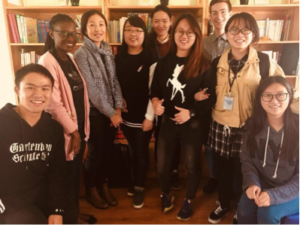It was a fresh weekend morning in Beijing, a couple of MCF staff members and new volunteers were headed to our latest address. We were a small team of 10, and many of us were new to teaching as volunteers. Nonetheless, our coordinators Lorna and Fana did a splendid job in settling us in and sorting out the materials in advance to help us.
The school was large and spacious, and we were each allocated a small classroom that lined the parade square. We were promptly greeted by the children who were lined out in the parade square, most of them around 5 years old. They were especially radiant and excited to be meeting us, and many greeted us with a shy wave of hand and “ni hao”.
In the classroom where I was teaching, the children had to practise the first few letters of the alphabet, some phrases for self-introduction and some simple descriptions for emotions. Despite many of them being first-time learners of English, they picked up the pronunciation of vowels very quickly.
I often come across articles online which mention that children have stellar language acquisition abilities, and the session with these students has proven this correct! With a few fun facial exercises drills and repetition of key words, I found that within a short hour, they could easily introduce themselves and grasp the main ideas of the games. I divided the children into smaller groups and raced them to say a loud “hello” to any MCF volunteer they met, or to silently place their fingers to their lips when I say the word “quiet!”. They were able to remember these key commands until the end of class. Through “Simon Says “, the students could further practise their listening skills, and learn how to respect others and work alongside their friends and teachers.
Sam*[1], the only student with an English name in the crowd, mentioned how his mother had got an English learning application for him, but that he often struggled to remember what he had learnt. This was not the case in this class – indeed, children learn best when they are having fun!
Lastly, it is worth noting that during the drawing games which identified human emotions, many students were able to promptly draw what each emotion represented in each circle. Even if all 15 children drew the face differently, they could all tell what each other what they were drawing. A paragraph from a recent article I have read aptly summarises:
“Machines might augment learning between humans but would never replace it… human learning was communal and interactive. For a robot, the acquisition of language was abstract and formulaic. For us, it was embodied, emotive, subjective, quivering with life. The future of intelligence wouldn’t be found in our machines, but in the development of our own minds. “
(The Guardian: “How babies learn – and why robots can’t compete” By Alex Beard)
Here’s hoping s that such games and activities facilitated by MCF volunteers can allow more children to not only learn, but to be better thinkers! Such intimate and lively learning sessions would not be possible without a steady stream of passionate student teachers and volunteers! Come learn more about us and volunteering opportunities here: mcfchina.org/about-us/
The below picture is a proverb painted on a school walls that reads: learn widely and act wisely.
Lim Jingwei
National University of Singapore
3rd Year Undergraduate
[1] Names changed to protect identity of student.


